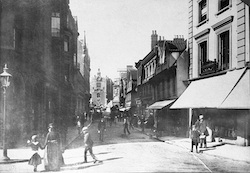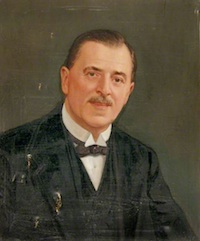Herbert Witard emerged from a childhood of dire poverty to become an ILP councillor and Labour’s first Lord Mayor of Norwich. MAGGIE PEPLOE tells the tale.
The 10-year-old boy selling newspapers in 1883 on the corner of London Street, in Norwich (below), with his ragged clothes and worn-out boots, could surely not have imagined himself one day strolling through the city wearing the Lord Mayor’s chains of office. But that was the achievement of Herbert Edward Witard, whose years of hard work and devotion to civic duty were rewarded in 1927 when he was elected as the first Labour Lord Mayor of Norwich.
 Witard was born on 8 October 1873 at Clare in Suffolk. The family, originally from Norfolk, was numerous and poor, and moved soon after his birth to Norwich. His father died when Witard was six years old, leaving the family of 12 in dire poverty, relying on a few shillings a week handed out from the Board of Guardians to his mother.
Witard was born on 8 October 1873 at Clare in Suffolk. The family, originally from Norfolk, was numerous and poor, and moved soon after his birth to Norwich. His father died when Witard was six years old, leaving the family of 12 in dire poverty, relying on a few shillings a week handed out from the Board of Guardians to his mother.
Decades later, giving out prizes at Norwich High School for Boys, in his capacity as Lord Mayor, he recalled his early struggles: “When I was 10, I was selling newspapers at the corner of London Street – badly clothed, often almost bootless, labouring under exceptional circumstances. I was at work after school at 11 when I handed my newspaper business over to the next brother.”
He finished his formal education at 12 when he had to leave St Augustine’s Boys’ School. The following year he made his way to Great Yarmouth and spent two years working as a cabin boy on a fishing smack. After that he worked in the boot and shoe trade, and had a reputation as the best turnshoe maker at Southall’s, Norwich.
At a speech to the annual meeting of the Early Closing Association, in March 1928, at the Mansion House in London, Witard recalled that as a lad he worked in a factory for 10 hours each weekday and five on Saturdays. The workers then had to wait until six or seven o’clock on Saturday evening before they could draw their pay.
His early experiences clearly politicised him, and he was associated with the formation of the Norwich branch of the Independent Labour Party in 1894, attended by Keir Hardie, at the time of the Trades Union Congress in the city. The Norwich Labour Party was formed in 1919.
Witard also spent some time away from Norwich and became secretary of the campaign committee supporting Ramsay McDonald’s candidature for the London County Council in 1897. It may have been these years he was looking back on in a speech he gave in 1928 at the Norwich Church Army Labour Home, which took in unemployed men and helped them get back on their feet. He said:
“I remember when I had more energy than sense, perhaps, deciding with three other young fellows to walk to London to try and get work. We reached our destination and though we had not sufficient money to pay rail fares, we had just enough with which to obtain some food on the road and a night’s lodging. It was the dirtiest place I had ever seen, and I have seen a few.
“The next night we decided we would sleep on the fields at Leytonstone rather than waste the remaining few shillings we had in going into what were called respectable working-class lodgings. We had a very happy night in the field. The weather was good and we had no complaints. Each of us obtained work, but had it been then that there was some place where we could for a small payment have received proper accommodation with adequate cleanliness it would have been helpful to us.”
Councillor and Mayor
In 1903 Witard became the first city councillor of the Norwich ILP, and remained on the council until he resigned in 1951, apart for one four-year break. From an early age he took a keen and active interest in groups aimed at providing some financial help to those in difficulty.
At the age of 18, Witard was secretary of a friendly society, and by the time he was 26 was Grand Master of the East Anglian Unity of Odd Fellows. In 1910 he became the Norwich manager of Planet Insurance Society, later amalgamated with the Co-operative Insurance Society, of which he was the local manager.
He further established himself as figure of importance in civic society by becoming a magistrate in 1914, and he was elected an alderman in 1922. His two election defeats came immediately after the First World War, in 1918, and in 1922, when he stood on both occasions as a Labour candidate in the Parliamentary elections.
He became Lord Mayor of the city in October 1927. It can be no coincidence that this was the year in which the mayoral allowance was established. Until 1927, a private income was necessary to take up the office of mayor and cover the cost of entertainment. In that year Robert Bignold estimated his expenses at £2,000 and urged that the allowance be introduced, enabling more candidates to come forward.
At his speech acknowledging his election Witard made a point of his financial circumstances: “Being just a salaried official I am not a wealthy man. You who may be expecting subscriptions to causes and associations will have to treat me very lightly because I assure you I shall be treating you very lightly.”
He also set at rest the minds of those who may have feared that his election might lead to revolutionary changes. “I am fully conscious of the fact that the office of the Lord Mayor is one of great importance and one in which tradition and custom play a great part, and it is not my intention in any shape or form to depart from the customs and traditions that have so long been part of the city’s history.”
In the speeches that he gave during his year of office as Lord Mayor, he referred openly to his own poor background and lack of extended formal education, but it was always without bitterness.
In 1938 he was given the honorary freedom of Norwich, when the then Lord Mayor, Charles Watling, said of him: “He is a man of the people, bred among us, rising step-by-step through his own unaided efforts, serving his city and his fellow men, and throughout his life exhibiting a quiet force of character that most of us must envy.”
Herbert Witard died in April 1954, aged 80, at his home in Bracondale, Norwich. He was survived by his widow, Agnes Mary, whom he had married in 1905, and their daughter Marion.
—-
This article was orginally published by Norwich Heritage Economic and Regeneration Trust (HEART) in May 2010. Many thanks for permission to reproduce it.
Sources
- Eastern Daily Press
- Lord Mayor’s Newspaper Cuttings 1927-1928, Norfolk Heritage Centre
- Records of the Norwich Labour Party, Norfolk Record Office
- The Mayors and Lord Mayors of Norwich 1836-1974, by Patrick Palgrave-Moore; Elvery Dowers Publications, Norwich 1978


